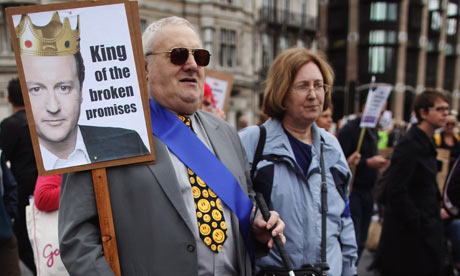
The pressure on the coalition to reconsider controversial cuts to disability payments increased last night after it emerged the mayor of London, Boris Johnson, has placed himself at odds with ministers over a key plank of the welfare reform bill. .
Johnson’s response to a consultation on changes to the Disability Living Allowance is critical of planned changes that will see hundreds of thousands of disabled people potentially lose benefits of up to £70 a week for care and mobility expenses.
Johnson is concerned that the changes could lead to financial hardship and social isolation for chronically ill and disabled people, and push an already disadvantaged group deeper into poverty.
His submission states: “While some reform may be necessary … the mayor is concerned that, if the focus of this reform is solely efficiency driven, government may fail to ensure that the needs of disabled people are adequately met.”
It adds that the changes could “potentially condemn the parents of disabled children and young people, and the children themselves, to a life of financial hardship rather than financial assistance”.
His objections– which were submitted early last year but only came to light after disability activists requested to see responses under the Freedom of Information Act – will increase pressure on the government before key debates on the welfare reform bill in the Lords over the next two weeks.
Johnson’s concerns over the DLA changes could harden attitudes among coalition peers. Last month 13 Lib Dem peers and one Tory helped defeat government plans to cut housing benefit payments for social housing tenants with spare bedrooms.
Liam Byrne, the shadow work and pensions secretary, said: “We have argued that the reform of DLA is a shambles. Most people in the Labour party believe that reforms are necessary but government has set about reform of DLA in a hamfisted way that risks plunging into poverty people who have paid in and need support.”
The government proposes to replace the Disability Living Allowance with a so-called Personal Independence Payment (PIP). This would focus payments on claimants deemed to be most in need as a way of reducing spending on this benefit by 20% by 2015-16.
The Disability Living Allowance is paid to around 3.2 million people, including children, with a wide range of illnesses and disabilities including cancer, spinal injury, mental health problems and learning disability. Campaigners say the payments are vital to enable disabled people to work.
The benefit is typically used to pay for equipment and mobility aids, travel costs and expenses related to specific medical conditions such as special diets.
Johnson’s submission also makes it clear that he objects to the government’s proposal to cut benefit to people currently receiving lower-end DLA payments of around £20 a week.
It states: “The mayor does not support this change, as those on the lower rate component … may lose their access to this benefit.”
The mayor’s objections were uncovered by a network of disability activists and bloggers, including Sue Marsh and Kaliya Franklin, loosely based around the Diary of a Benefit Scrounger and Broken of Britain blogs.
Their report, Responsible Reform, analysing the proposed changes to the Disability Living Allowance, to be published on Monday, finds that Johnson’s objections are shared by the “overwhelming majority” of respondents to the consultation.
A spokesperson for Johnson said: “The mayor has made his views known in a thoughtful and comprehensive submission to the government. His focus is always to ensure that vulnerable Londoners are protected in any fiscal and legislative change.”
The Responsible Reform report claims the government has misrepresented the level of opposition in its formal response to the consultation, and has consistently used inaccurate figures to exaggerate the rise in claimants.
Marsh said: “We believe that reform must be measured, responsible and transparent, based on available evidence and designed with disabled people at the very heart of decision-making. Currently, we do not believe this to be the case.
“While disabled people welcome reform of DLA where it will simplify the system and better support their needs, they do not want a new benefit. They believe it is a costly irrelevance during a time of austerity.
“We urge members of the House of Lords, across party political boundaries, to take note of this research and the strength of opposition to the proposals. It is not too late for them to halt these deeply damaging reforms.”
A DWP spokesperson said: “Disability Living Allowance is an outdated benefit which fails to target support at those who need it most. Our initial consultation ran almost a year ago and our proposals have developed significantly since then. We have been working closely with disabled people and disability organisations on the introduction of the Personal Independence Payment and have listened to their views”.
Paul Farmer, the chief executive of the mental health charity Mind, said: “Rather than getting out of control as the government claims, DLA has been increasingly going to people who really need it.
“The proposed 20% cut to the budget will have an enormous impact.”
guardian.co.uk © Guardian News & Media Limited 2010
Published via the Guardian News Feed plugin for WordPress.

Boris for Prime Minister! Hang on – what am I saying?
Steady on, Wendy MacKenzie! :-/ ! LOL